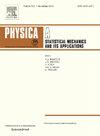Dynamic immunization for disinformation spreading on signed social networks
IF 2.8
3区 物理与天体物理
Q2 PHYSICS, MULTIDISCIPLINARY
Physica A: Statistical Mechanics and its Applications
Pub Date : 2025-02-01
DOI:10.1016/j.physa.2024.130321
引用次数: 0
Abstract
Signed social networks are a special type of social network with positive and negative relationships. It can provide a powerful framework for studying information spreading in light of opposite user relationships. Currently, static immunization strategies have been constructed to control the spread of disinformation on signed social networks. Here, we focus on dynamic immunization that can be real-time immune to the spread of disinformation on signed social networks, which is vital for shaping public discourse and opinion formation. Accordingly, we proposed the signed contact-tracing (SCT) considering the opposite attitudes of users toward information. Experiments with synthetic and empirical signed networks explore the impact of signed network structure with positive and negative edges on dynamic immunity and confirm the necessity of considering signs in the dynamic immune process. Then, the effectiveness of SCT was verified by two evaluation indicators, and find that targeting individuals with the same ideological group has a smaller spreading range and lower spreading speed than those without differentiated attitudes. Furthermore, the signed backward-contact-tracing (SBCT) based on SCT optimization offers optimal regulatory recommendations for enhancing immunity against disinformation in signed social networks. The study demonstrates how negative relationships impact the dynamic immunity of disinformation, and improves the application of dynamic immunity strategies in signed networks.
求助全文
约1分钟内获得全文
求助全文
来源期刊
CiteScore
7.20
自引率
9.10%
发文量
852
审稿时长
6.6 months
期刊介绍:
Physica A: Statistical Mechanics and its Applications
Recognized by the European Physical Society
Physica A publishes research in the field of statistical mechanics and its applications.
Statistical mechanics sets out to explain the behaviour of macroscopic systems by studying the statistical properties of their microscopic constituents.
Applications of the techniques of statistical mechanics are widespread, and include: applications to physical systems such as solids, liquids and gases; applications to chemical and biological systems (colloids, interfaces, complex fluids, polymers and biopolymers, cell physics); and other interdisciplinary applications to for instance biological, economical and sociological systems.

 求助内容:
求助内容: 应助结果提醒方式:
应助结果提醒方式:


